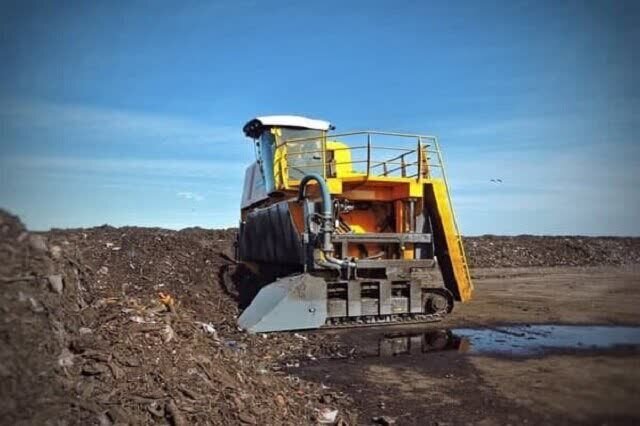Domestically-made ‘compost turner’ aims to improve waste management

TEHRAN –An Iranian knowledge-based company has managed to build a ‘windrow turner’ machinery that converts organic and wet waste into compost.
It is one of the most applied methods in the world for waste recycling with the aim of improving efficiency in waste management, ISNA reported.
Due to the lack of primary resources on the earth and the importance of recycling, many techniques with different methods have been proposed to recycle waste.
Items such as paper, glass, plastic, and metal are separated from waste and recycled, but a large amount of urban waste is made up of wet waste produced in kitchens, including fruit peels, food waste, and other wet waste.
Sometimes the percentage of wet waste reaches more than 70 percent. Therefore, recycling this amount of waste is very essential. By localizing a self-propelled compost turner, wet waste will easily turn into compost that can be used in agriculture, gardening, and horticulture.
Since more than 70 percent of the amount of urban waste in Iran is also made up of organic materials, recycling them to be used as agricultural fertilizer will greatly benefit the environment and significantly reduce the volume of burial waste materials.
Meanwhile, bio-compost production can be placed at the top of recycling and sanitary waste disposal programs in the country.
Improper management of waste
Today, one of the most serious problems of the country’s environment is improper management of all municipal, household, industrial, hospital, and hazardous wastes, which has caused environmental pollution and a negative impact on the quality and quantity of biological resources (water, soil, and air) and incurs a loss of huge sum of money annually.
Improper management of waste in the country causes 870 trillion rials (some $1.7 billion) in damage to the environment and natural resources every year, an official with the Department of Environment (DOE) said on January 29.
Some 445 thousand tons of urban, rural, medical, agricultural, and industrial waste are generated per day, equaling 164 million tons per year, leading to land, water, and air pollution, IRNA quoted Mehdi Khadem-Sameni as saying.
Converting waste into fertilizer and energy, using standard waste incinerators, and modern methods such as digesters and pyrolysis are among the known strategies used in the world for handling waste, but these methods do not exist in the country, he added.
The current methods used in the country for waste management are old, the official noted, regretting that up to 80 percent of the waste that can be recycled to be used for different purposes is discarded.
“Out of around 600 waste management centers across the country, just four to five are standardized. In other words, some 96 percent of the waste is just dumped in landfills.”
According to World Bank, the pollution of resources in 2004 incurred a loss of about 8 billion dollars to the country, and the figure rose to about 10 billion dollars in 2009.
According to the DOE, an estimated 10 to 17 percent of the total produced waste is recycled. While in developed countries this number reaches up to 70 percent.
In 2021, Iran ranked 17th in terms of waste production, according to the World Population Review.
Although there will be pollution as long as there is consumption in any way, it can be kept to an acceptable level by considering green options so as not to cause excessive pollution of the environment.
Some 65 percent of waste is "wet" and 35 percent is "dry", while 25 percent is processed and the remaining 75 percent without processing is buried directly and only 10 percent is separated at the source.
MT/MG
